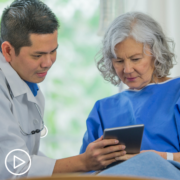Multiple Myeloma: Danielle’s Clinical Trial Profile from Patient Empowerment Network on Vimeo.
Multiple myeloma patient Danielle was a very active person – and even went on vacation – right before receiving her diagnosis. Her myeloma journey unfolded with her myeloma symptoms, diagnosis, treatment, and participation in a life-altering clinical trial. “I decided to do the study trial because I also wanted to help individuals. If it wasn’t going to help me, then my data that they collect from the study trial will definitely help the scientists, researchers, the doctors. It would help them try to find a cure.”
See More from Patient-to-Patient Diverse Myeloma Clinical Trial Profiles
Transcript:
Danielle:
Hello, everyone. My name is Danielle.
My myeloma story began in 2011. I was experiencing pain in my hip and my back area, and it was the pain that would come and go. I was also very lethargic in 2011 and couldn’t understand why I was so extremely tired, so I thought the pain in my hip and back area was due to sciatic nerve, and I just didn’t do anything about it, ignored the pain. My husband and I went on our first trip without our sons in October of 2011, and two days before the trip, I developed this really bad nasty pain in my hip and leg area, which actually altered my walk, but I had no idea what the heck was going on, and so I was so frustrated that I… As soon as we got home, I went to see an orthopedic doctor because at that time I was working out like five times a week, so I thought maybe I pulled something, a pinched nerve or something. So I went to see him, he took X-rays, I believe it was an MRI, couldn’t be sure, but when I went back to get my test results, he sat me down and said, “Mrs. Spann, there’s a mass here in your fibula, and I’m going to recommend you to an orthopedic oncologist.” So, that was the very beginning of my diagnosis, initial diagnosis. Of course, I was in denial because I’m like, I knew what an oncologist was, but he must not be talking to the right person, but I went ahead and I met with the orthopedic oncologist. He ran a bunch of tests and mentioned to me that I had myeloma, which is concentrated in one area, which was my fibula, and then he recommended that I have my fibula removed on my right leg. Two days before surgery was scheduled, I received a phone call from his office, saying, “Mrs. Stann, you have lytic lesions all throughout your skeletal structure, and we’re recommending that you go see a bone marrow transplant oncologist.” So now it’s becoming real. The diagnosis is what it was, and I just wanted to know how I could basically fight this. I’m the type of person where you tell me one thing and let’s try to find a solution, so I met with the bone marrow transplant specialist, the oncologist, and then we formulated a plan, and that plan was for me to go on my first study trial. And so that was my introduction into my having multiple myeloma.
I made the decision to participate in a trial, because I trusted my doctor. He had the expertise to understand where my myeloma was, the counts, how aggressive it was, and he recommended that I go on the study trial. He also told me that if the study trial was not going to work for me, or if it wasn’t helping me, that he was going to take me off the study trial. So, I was on the study trial from like January to March…to the end of March, and he sat me down and said that it was not working, my numbers weren’t really moving, and that he was taking me off the study trial. And he took me off the study trial, there were some other treatments that were involved, and then I had two stem cell transplants. After the transplant in 2012, I went ahead and started another treatment regimen, and I was on that for several years, which worked well. My numbers were coming down, but then unfortunately they started going back up, so he mentioned that I should go on another study trial. I weighed the odds, and I knew that he would not lead me down the wrong path. So, I went ahead and I participated in the study trial that I’m still on today, and I’ve been on it for about three, four years.
I decided to do the study trial because I also wanted to help individuals. If it wasn’t going to help me, then my data that they collect from the study trial will definitely help the scientists, researchers, the doctors. It would help them try to find a cure. And so that’s what I wanted to help in some form or fashion, and when I first was diagnosed going to the Winship Cancer Center twice a week, there was a quote that was posted in the cancer center, and that quote was by Dr. Martin Luther King Jr., the quote read, “Life’s most important and persistent question is, ‘What have we done to help others?’” And I would go into the center and I’m like, “Yeah, what have I done to help others?” And me participating in the study trial, I felt like I’m helping others indirectly, and it wasn’t always just about myself, it was, “Okay, yes, the study trial gives the data, and it’s helping me, but it’s also helping that next person as well.”
So, I always look at my life as before diagnosis and after, and my after does not look like my before, I can’t do the same things, I can’t do the same things that I used to do. And one of those things is going to the mall and being in there like 10 hours, that’s so remedial, but it just goes to show like I cannot exert myself the same type of energy that I could before diagnosis. And again, that’s my new normal. I stay positive with everything in life, things happen, but you just have to do what you can to make it better, no matter what it is.
I am happy and proud and so grateful and thankful to mention that as of January 2021, my myeloma is 0% detectable, which means there’s no presence of multiple myeloma in my blood, in my urine, nor in my bone marrow. And so I’m still on a study trial, and I have two different chemo meds that I have to take, and I just act accordingly if I know that one of the chemo meds that I have to take twice a week gives me an upset stomach. I just accordingly in finding different ways to push through it. It is what it is, and my motto when I was having my bone marrow transplants was, “This too shall pass.” And so no matter what I’m going through in life, no matter how down I get. This moment will pass. And so tomorrow, you’ll look back on today and say, “You know what, I did it, I made it.” And you’ll do that for the next day, until you realize that you’re just constantly defeating that previous day, and you’re moving forward.
So, I’ve heard the terminology of a clinical trial, never really paid attention to it because I never had to…I had an idea what the clinical trial was. But once it really came home to me, I realized that, in my words, the clinical trial is collecting the data necessary, they’re going to give you the trial medication, because they’re looking to get this, this medicine approved to put on the market. These medications would not get approved by the FDA, acetaminophen (Tylenol) at one point had to go have a study trial and then get approved by the FDA and then can be distributed to the masses. And so it’s the same with these other drugs. We need individuals to participate positively, knowing that if this is not helping me right now, it will help someone in five years, in two years, in 20 years. The advice that I would give is to trust your doctor, your doctor would not recommend a study trial if he felt that there was a medication that’s already on the market that would help you better. If the study trial you’re on is keeping you with your family, and at the same time is…the scientist, the researchers they’re gathering all this data, it could come to be an actual medication in three, five, seven years. And so just think of it as something that you’re helping society…and your fellow…and your fellow man.









